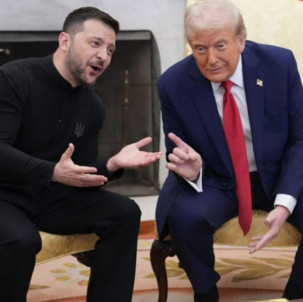The other day, the Constitutional Court of Poland ordered that the Polish Constitution be above international laws. This proved a non-routine event for both Poland and the European Union, which the Polish Republic has been part of since 2004. Neither was it among the Constitutional Court's planned activities.
An urgent consideration of balance between the Polish Constitution and international law took place at the petition of Polish Prime Minister Mateusz Morawiecki after the European Commission (the EU's current governing body) imposed a fine on Poland for non-compliance with EU court decisions of 2019. Its form suggests daily accruement and accumulation.
As legal proceedings indicate, the Constitutional Court's decision was not a general statement, but it clearly aimed to isolate Poland in the EU legal space. In other words, the Polish decision implies a refusal to execute a verdict of the EU Court.
Poland appears to withdraw itself from the jurisdiction of the European Union, which breaks up its legal space. One of its fundamental principles is a single legal field suggesting equal rights of all the member states and their recognition of EU law as the only source of legislative decisions in the European Union.
It would be strange in this context if the Polish moves caused no abhorrence with the Union. The leading EU countries – Germany and France – took it most hard, querying the expediency of Poland's continued affiliation with the EU.
The Polish side explained that the Constitutional Court's ruling does not allegedly undercut the European Union, and that the country is only going to be selective about EU decisions, keeping options open to act upon its own interests. Virtually, the Polish authorities want to legitimize their right to choose what to do and what to ignore as regards the European Union's activities.
The government-initiated court ruling was not an immediate one, with its real author being leader of the ruling coalition – Jaroslaw Kaczynski's Law and Justice party. Preparation's began in 2017, when Poland experienced a Kaczynski-initiated judicial reform that deprived judges of independence. The European Union recognized the reform as contrary to EU law and obliged the Polish leadership to bring the election of judges in line with it. The Polish authorities shrug this off, and this eventually resulted in the 2019 decision by the EU Court, which the Constitutional Court of Poland took issue with.
A striking thing is Law and Justice party's aggression towards the European Union which is actually being asked to accept the Polish terms for understanding EU membership.
The motives for the Law and Justice party' thuggish behavior have both domestic and foreign policy origins.
Poland's leading opposition party is the Civic Platform, with its activity associated with the Polish politician Donald Tusk, who was chairman of the European Union until 2019. Currently, he is nurturing a plan of returning to Poland and heading the party again. Such a turn of events will certainly chip away at the Law and Justice party ahead of the parliamentary elections due in 2023 and the presidential elections of 2025.
In this light, performance by the Law and Justice party looks like an attempt to minimize EU's influence on political processes in Poland over Tusk's expected return to Polish politics, given his experience, connections and influence in the European Union. Moreover, most Polish people objected the Constitutional Court's ruling and this may transform into their leaning towards Tusk.
Within the European Union, the Law and Justice Party generates the concept of promoting Poland as the leader of Eastern Europe and thus creating a counterweight to Germany and France, i.e. establishing additional powerhouses in the EU. Thus, the time for Constitutional Court's decision was chosen with premeditation, particularly due to the unclear post-election situation in Germany, complicated by the fact that such a prominent European leader as Merkel quits politics.
Internationally, the Law and Justice Party is known for its pro-American focus. In the military field, let's recall Poland's appeal to the United States under Donald Trump about the creation of an American military base in the Polish territory. As for economics, they seek turning Poland into a hub for receiving American LNG and distributing it among the European countries, with profits to be split with the United States.
The latter circumstance is curious because Poland is the key and dominant recipient of subsidies from the European Union, that is, much of the sum contributed by all the EU countries goes to Poland and is spent, among other things, to isolate and strengthen the American presence in Europe.
After the ruling by the Constitutional Court, EU leaders and founders faced a challenge of how to preserve the European Union in the form outlined in its charter documents that other countries follow.
Now the key question to the EU is how to deal with Kaczynski's Poland?









